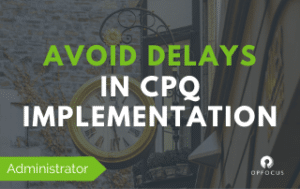How to avoid delays in CPQ implementations
 Every company that looks to implement Salesforce CPQ seeks to generate accurate, efficient, and consistent quotations. In a world where quick access to accurate information helps close business deals faster, Salesforce CPQ ensures that your sales and customer success reps have the ability to quote products with correct pricing, correct product configuration, and correct management review for approvals, and helps your business grow. Let’s discuss how you can avoid delays in CPQ implementation, so your business can focus on driving revenue.
Every company that looks to implement Salesforce CPQ seeks to generate accurate, efficient, and consistent quotations. In a world where quick access to accurate information helps close business deals faster, Salesforce CPQ ensures that your sales and customer success reps have the ability to quote products with correct pricing, correct product configuration, and correct management review for approvals, and helps your business grow. Let’s discuss how you can avoid delays in CPQ implementation, so your business can focus on driving revenue.
While Salesforce CPQ technology streamlines your quote to cash process and makes your sales reps more efficient, clients sometimes run into speed bumps in smoothly and quickly implementing the tool. Project after project, we notice that discussions about clients’ business processes untangles massive spider webs. Companies that are prepared to make decisions quickly and get on the same page have a much easier path forward.
7 Key Topics
CPQ projects often face challenges and potential delays in implementation due to the following topics:
1. Product Configuration
a. How are your products and services sold? One Time or Subscription?
b. Can all/any products be discounted? Any restrictions? Retroactive discounts?
c. Do you have any pre-packaged/pre-configured offerings?
d. Who maintains product configuration rules?
2. Pricing
a. Is your pricing logic documented?
b. Do you have any KPI’s that need to be measured?
c. What totals do you plan on displaying?
d. Do you need to calculate margins?
3. Quote Template Orientation
a. What is your current quote template?
b. Are all products shown?
c. What type of terms and conditions do you utilize?
4. Approval
a. Do you have an approval matrix in place today?
b. Who are the approvers?
c. What are the specific rules for needing approvals?
d. How many approval workflows are needed?
5. Integration
a. What systems need to be connected to CPQ?
b. How does the data flow between these systems?
6. Quality of data
a. How good is existing product data?
b. Here is data currently stored? People’s heads or documentation?
7. Outliers
a. Every company has 1 off situations within their business process and deal-making. Examples include custom terms, custom pricing, unique product offering, and even special quantity offerings that are outside the typical deal ranges. Trying to configure CPQ rules and automation to capture these rare deals can lead a project into custom development work that takes a high volume of hours away from the project budget to capture a small number of quote needs.
b. Consider the 80-20 rule to avoid initial delays in implementation. When aiming for 80-98% of the quote configuration to be done automatically by the CPQ system, we capture a high volume of all the daily quotations required to be created. When the initial project is a success, aim to capture the rare complex deals through configuration automation in the next phase.
The Impact
In my years of working on CPQ projects, I have encountered companies that have come prepared with all of these questions answered and ones that had not given them any thought. The companies with answers to these questions ahead of time not only saw implementations completed more quickly, but also ran into far fewer unexpected issues along the way.
Companies that we have seen come prepared with answers and an understanding of these questions typically have:
- All Products documented in one located and in shareable format (excel, CSV, PDF)
- Price documented for what is allowed to be configured by users and what is firm.(quantities, discounts, price changes)
- Business Process for approvals mapped in a document that explains the people and the criteria involved.
- A quote template that is approved for commercial use.
- Clear goals for desired system implementation results.
- An excitement to work on the project.
Final Thoughts
Understanding these questions and topics in detail, and how they relate to your business’s quote to cash process, will be essential to avoiding delays in CPQ implementation. Ensure you’re aligned with key stakeholders, have gathered documentation, and know all primary use cases. Your shiny new CPQ tool will match your daily operating needs in no time!
Choosing the right Salesforce partner for your CPQ implementation can help guide business discussions, ideas, and formatting, and translate your requirements into a successful system that provides accurate and efficient quoting for your sales reps on a daily basis. One thing many RevOps leaders find difficult is conveying the value to upper leadership. Connect with one of our specialists if interested in exploring whether Salesforce CPQ is right for your team!


